| Srl | Item |
| 1 |
ID:
159905
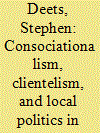

|
|
|
|
|
| Summary/Abstract |
Both liberal and corporatist consociational systems are often characterized by identity-based networks that rely on clientelism and are difficult to hold accountable. This article uses Beirut's 2015 garbage crisis and 2016 municipal elections to argue that cities can be important sites for building new civic networks because cities often have resources and frames that can be used to mobilize individuals in different ethnosectarian networks. These civic networks, by promoting ideas of citizenship and state accountability, can be a significant factor in increasing liberalism in consociational systems.
|
|
|
|
|
|
|
|
|
|
|
|
|
|
|
|
| 2 |
ID:
087696
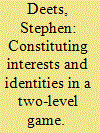

|
|
|
|
|
| Publication |
2009.
|
| Summary/Abstract |
This paper uses the conflict between Hungary and Slovakia over the Gabcikovo-Nagymaros Dam to examine two foreign policy issues. The first is how states determine their interests and how perception of gains and losses arise and change. The second is the reality that international norms are rarely clear and often conflict, making answering questions of whether states have "internalized" or are abiding by norms problematic. This case is a good vehicle for addressing these questions as the dam dispute began during the communist period and has continued through the political and economic transitions to European Union membership. It also was the focus of a groundbreaking International Court of Justice case on the application of ecological necessity to treaty obligations. Fleshing out the model of a two-level game with insights from other theoretical perspectives, this article argues the key to this stalemate is the interrelated process through which state identity and understandings of vital interests change, creating frames in each state around different international norms.
|
|
|
|
|
|
|
|
|
|
|
|
|
|
|
|
| 3 |
ID:
152580
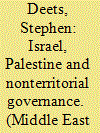

|
|
|
| 4 |
ID:
070183
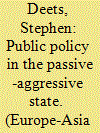

|
|
|
| 5 |
ID:
190083
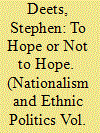

|
|
|
|
|
| Summary/Abstract |
This Rapid Communication examines Lebanon’s 2022 Parliamentary election in the context of other recent elections in consociational and populist regimes. The Lebanese electorate is now divided both by sectarian identity and by a pro- versus anti-establishment cleavage. This second cleavage makes Lebanon look more like other electoral authoritarian regimes. In light of scholarly work that ties electoral authoritarianism to late-stage neoliberalism, Lebanon’s recent election prompts renewed attention to the neoliberal assumptions embedded in its and other consociational systems.
|
|
|
|
|
|
|
|
|
|
|
|
|
|
|
|
| 6 |
ID:
098243
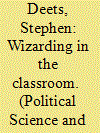

|
|
|
|
|
| Publication |
2009.
|
| Summary/Abstract |
This article describes teaching a course called Harry Potter and Politics. Focusing on aspects of political culture, the class tackled themes of identity, institutional behavior, and globalization. Teaching Harry Potter has several benefits. Students are both familiar with the wizarding world and yet have enough distance to examine it dispassionately. The book is driven by ethnic conflict, political power struggles, and dysfunctional bureaucracies. Finally, there is an academic literature on the books. Beyond Harry Potter, teaching politics through popular culture is not only natural for addressing political culture, but taps into the ways undergraduates are increasingly experiencing politics.
|
|
|
|
|
|
|
|
|
|
|
|
|
|
|
|